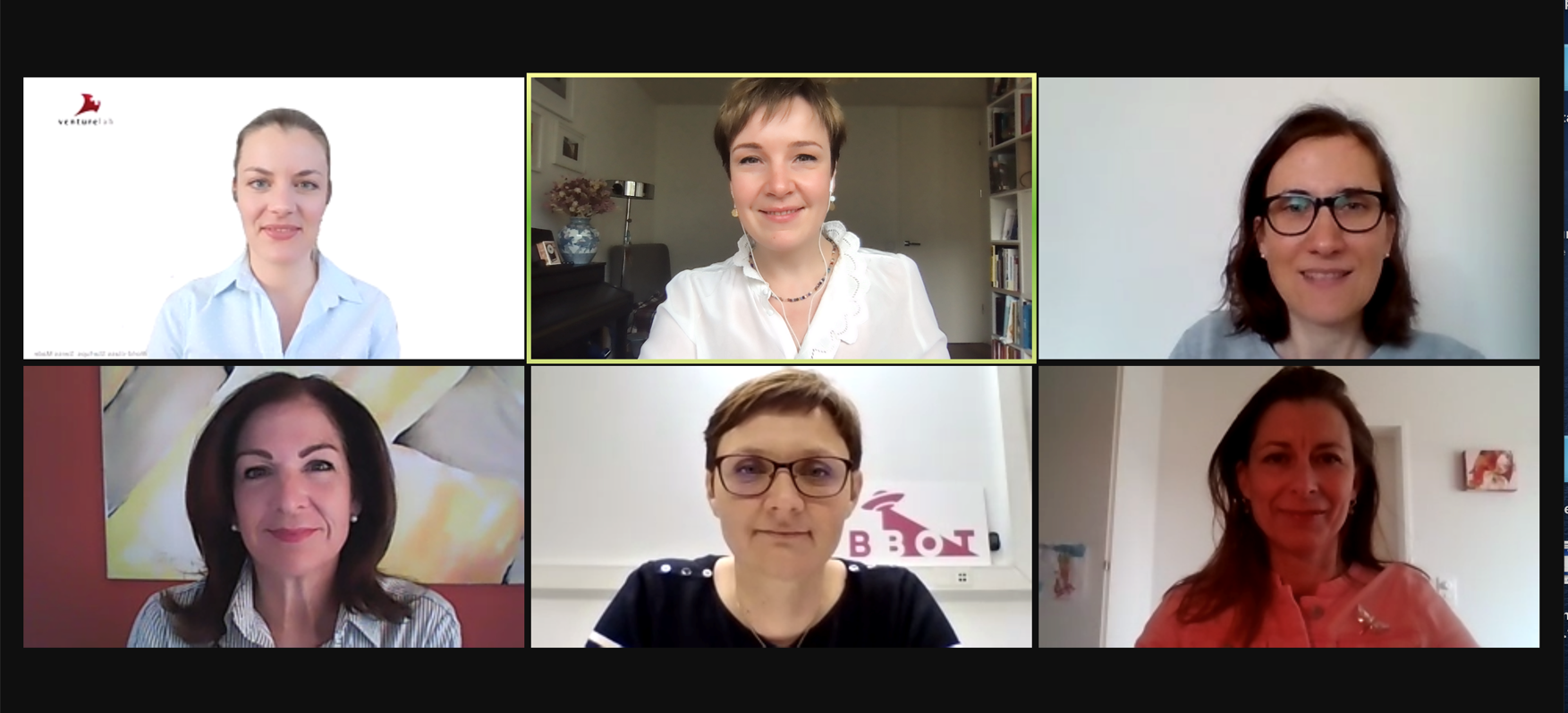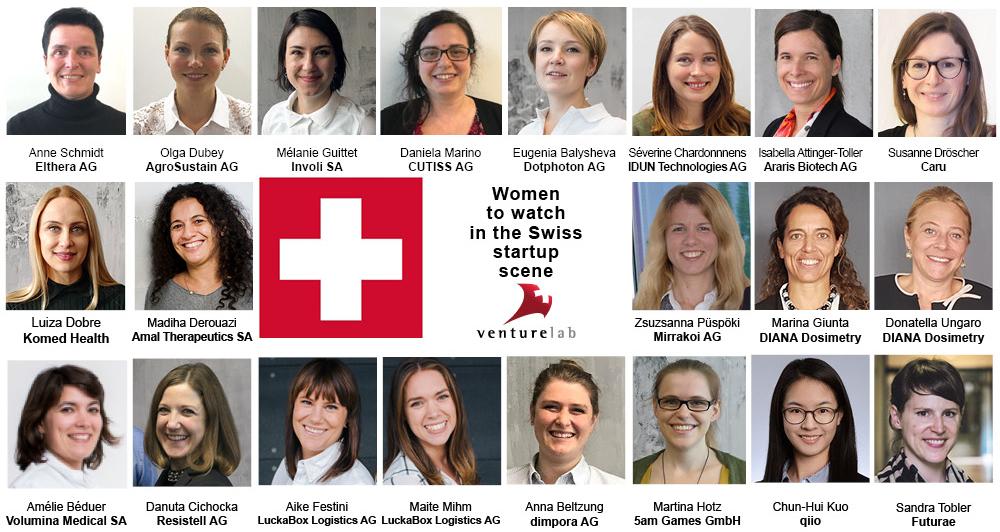This year’s International Women’s Day focused on breaking the bias. One critical skill to create diversity, equity, and inclusion is negotiation. In our webinar, Luiza Dobre, founder and CEO Komed Health; Kathrin Saner, corporate venturing at PostFinance; and Patricia M. Montesinos, business angel and president of FE+MALE Think Tank, inspired the audience with their experiences and insights.
The webinar aimed to help participants better understand the different aspects of negotiating within the Swiss startup ecosystem, and our three panelists shared their perspectives as entrepreneurs, coaches, and investors. Venturelab’s Andrea Merz moderated the panel, and our overview includes some of the highlights—note that the answers have been edited for brevity and clarity.Luiza Dobre (bottom right) is the founder and CEO of Komed Health, a startup referred to as the “Slack of healthcare” specialized in communication and collaboration in the healthcare sector. She founded Komed Health in 2017 and successfully completed three investor rounds.
Patricia Montesinos (top left) is an entrepreneur, a business angel, and an active startup coach and jury member in the Swiss startup ecosystem. As the president of FE+MALE Think Thank, a Zurich-based non-profit association, she supports female entrepreneurship in Switzerland and abroad.
Kathrin Saner (top right) is the former COO of the news portal nau.ch and is currently working for PostFinance as a venture capitalist. Kathrin shared her experience from the entrepreneur’s and the investor’s sides.

On leaving the ego at the door
Luiza: “Do not take things personally. It can derail the whole negotiation because you focus on the wrong things. Do not jump to conclusions. Instead, focus on what you want to achieve. If you deal with someone who has a big ego: If you can make the other person think that it was their idea, you will win the negotiation.”
On what makes a great negotiator
Kathrin: “The most important thing to remember: The goal of a negotiation is not to sign a deal but to accomplish something. And you can only accomplish something together with your counterpart. Do not just think about yourself but also your counterpart. How are they able to achieve what they want? This thought process leads to a solution-oriented negotiation.”
Patricia: “Take the time to analyze the details and the goals, and be prepared. To analyze what is going on and what you can bring to the table to offer value to the other party.”
Luiza: “Listen and ask questions. I am so passionate about what I do that I forget about others. It’s better to understand the other person than to jump directly to your goal and business. If you have the time, even if it is just five minutes before a meeting, do research and ask questions why they want to meet so that you can adjust your pitch.”
On the differences between negotiating as an entrepreneur and as an investor
Kathrin: “From the business side, the most challenging part was to get to the place where I was able to negotiate. As a startup, the problems start once you start negotiating. Investors take time to learn about your business and listen to the pitch, but the decision-making process is long. As an entrepreneur, you do not have that if you establish a business partnership. Getting the buy-in was more difficult on a business side than an investor side—my advice: Always try to get a warm introduction. If you want to get in touch with someone, check if you have someone in common on LinkedIn. That way, you can ask them to make an introduction.”
On advantages and disadvantages of being a woman when negotiating
Luiza: “Being a woman can open doors a bit. Personally, I have a lot of masculine traits, even though I look very feminine. I must say that you can stay true to who you are and your principles. I got comments that a man would not get: No man is told how he should dress or put his hair. But women get these comments. Stay true to who you are, and take advantage of the fact that it might open doors. Kill someone with facts, achievements, and passion; then it does not really matter if you are a woman or a man. My number one piece of advice: Be bold and be who you are. You don’t need to be anyone else. Trust yourself that you can achieve your goals. It is never a straight trajectory. But enjoy the journey with all its ups and downs.”
Patricia: “I want to highlight that business success has no gender. But I often see that men trust men. Sometimes, women face challenges men do not have, especially in male-dominated industries. Women have to work more to achieve results.
I see two main profiles in business: Women adopt male traits because she is in a male-dominated industry. For example, straightforward communication, risk-taking, or even self-promotion. I see these male traits in high-level of organizations, at the C-suite level. But then I also see businesswomen who do not reduce their femininity, and they bring other traits to the table, such as emotional intelligence that are said to be more female. Ultimately, all entrepreneurs face the same challenges. The most powerful women I have met were able to follow their vision with passion and determination, clear goals, and move forward with courage. They take any challenge that business brings and solve it with passion, ambition, and determination.”
How to mitigate bias among women
Patrica: “Women go against women. But it doesn’t help. We need to be conscious about it and bring an honest approach. Find some common ground and look at what you can leverage. It is important to remember that we can also be our own worst enemy and stand in our way. It is nice to understand the problem, embrace it and provide a solution.”
On breaking bias
Kathrin: “Every human being is biased. Even women are biased against women. Just because you have a female VC in front of you, your life will not be easier. It is critical to be aware of psychology when you enter negotiations. If you think that your alma mater is the best university, then you might favor alumni from that school. You need to acknowledge your bias and play with it. That is why it is important to know the other person you negotiate with. And maybe bring along a favorable person toward the negotiator’s specific bias.
Research from Stanford University examined pitches from men and women. The pitches themselves were not different from each other. But the questions the VCs asked the entrepreneurs were biased: Women were asked “defending” questions, like how they will defend their market or product. Men were asked “promoting” questions, such as how they would grow their company. If you can recognize the type of question you are asked, you can reframe it. So, if someone asks you how you will defend the market share, then reframe that question and say that the market is growing and you expect more demand. Highlight your USPs. Do not give a “defensive” answer.”
Patricia: “Our biases are often unconscious. Gender bias exists. We can see that in the investor industry, women receive less money. So there is bias in decision-making. There are also fewer women on the investment side, which affects business growth. The pay gap is another example. These biases impact people’s creativity and productivity. Bias prevents a lot of success.”
Luiza: “Reframing and turning the table is really helpful. Same with ego. When someone attacks you, and you take it personally, it can throw you off. Instead, ignore the personal attack, and reframe it.”
On flipping the script when a negotiation is not going your way
Kathrin: “Remember that you do not have to decide on the spot. When you feel stuck and unsure about what to do next, mention that these are new aspects, and you will do a follow-up and come back later. Never commit too quickly. It is totally okay to say that you have to ask the board or management first. That way, you can buy some time. If you do not know how to turn it around, then buy yourself some time.”
The final piece of advice for successful negotiations:
Patricia: “Preparation, preparation, and more preparation.”
Luiza: “Prepare, listen, and try to understand the other party.”
Kathrin: “A no doesn’t have to be a no forever. Negotiation can be a long track. You can always go back and try again later.”






